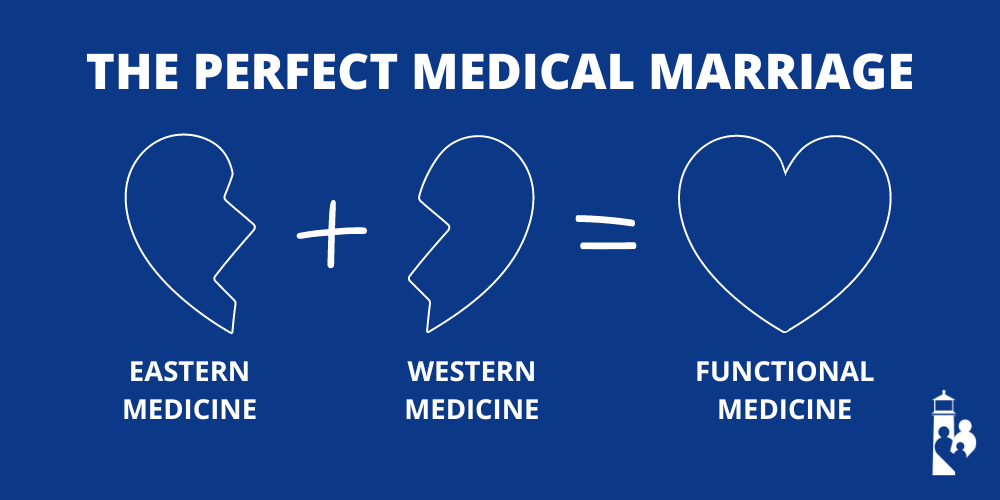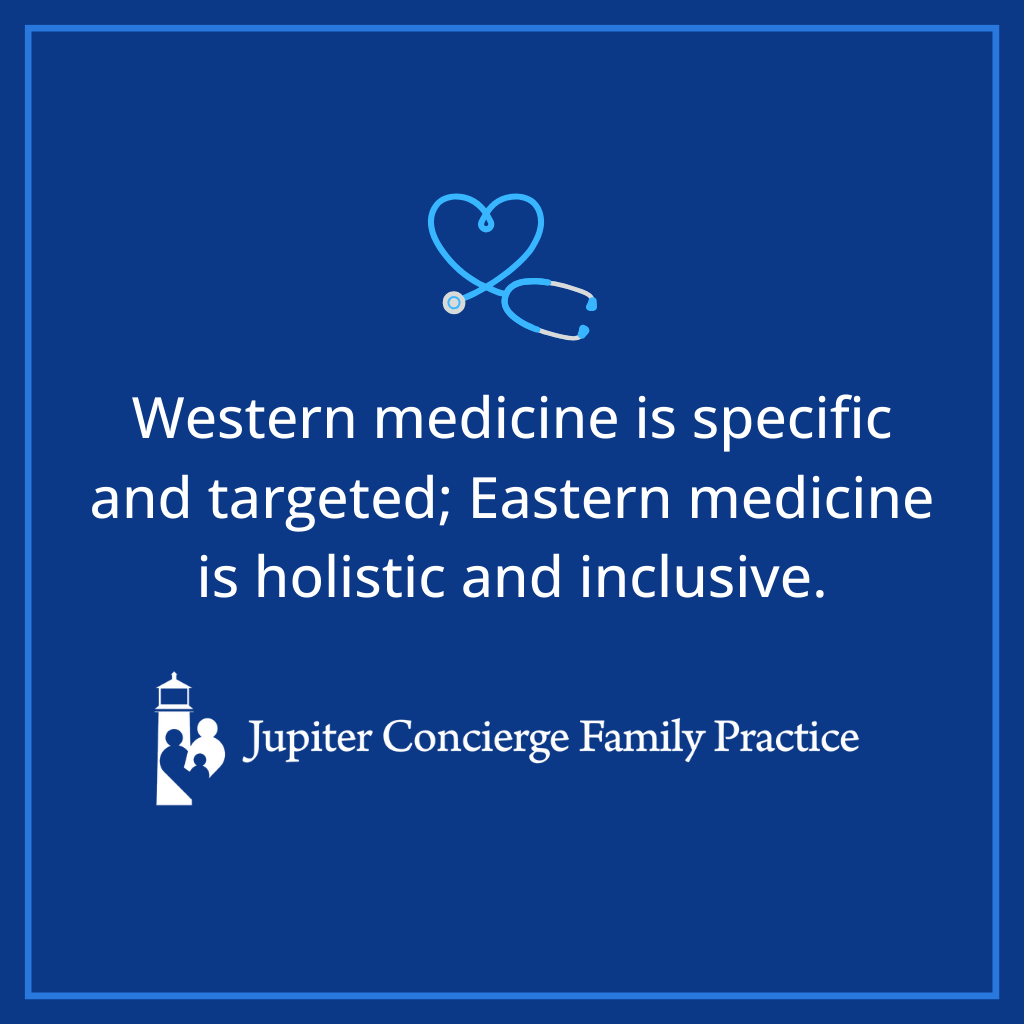
When I start working with new patients, I often find they’re confusingly familiar with the term functional medicine. They may have heard it in different contexts, but they struggle to understand what it is we’re really talking about.
In response to this confusion, I find it helpful to describe functional medicine as Eastern medicine with Western science.
Very often we think of Western medicine versus Eastern medicine as if they’re diametrically opposed and can’t be blended. I beg to differ. Functional medicine is the perfect marriage of Eastern and Western medicines. Read on to discover how.
Eastern vs. Western Medicines
Before we get into the nitty-gritty, let’s first define what we mean when we say “Eastern” and “Western” medicines.
Eastern Medicine
Eastern medicine is, generally speaking, medicine based on tradition. It’s passed down through the generations, both orally and in writing. The medicine itself is built around observation and trial and error.
We can understand the focus of Eastern medicine as treating the organism, not just the organs. Through an Eastern medicine lens, any specific issue is not isolated. The issue, whatever it may be, is viewed in the context of all the myriad other aspects of the body, because each part of the body affects and interacts with all the others.
Treatment-wise, Eastern medicine relies on natural herbal products as well as ways of altering a patient’s internal energy to help untangle counterproductive pathology and free up the body’s natural ability to heal. Some of the tools or styles of Eastern medicine include:
- Herbs
- Meditation
- Acupuncture
- Reiki
- Massage
- Chiropractic (perhaps Western in origin, but more Eastern in approach)
- Tai Chi
In recent years, Western science has isolated the mechanisms by which some of the above Eastern medicine tools work. Let’s take a deeper look at the first and last of that list: herbs and tai chi.
Herbal medicine, in brief terms, is consuming natural herbal products to remedy ill conditions. Herbs may not work immediately and can take a little time to produce an effect. This is in contrast to how we use Western pharmaceuticals, which are typically for a specific cause and bring about a more or less immediate effect.
That said, herbs produce far fewer side effects overall than what pharmaceuticals can bring. Furthermore, the benefits over the long run can equal — or even outperform — conventional pharmaceuticals.
Thanks to Western science, we now understand through studies that herbal medicine up (and down) regulates the genes that either help (or hinder) illness. Pharmaceuticals, by contrast, work with an on/off mechanism for specific bodily processes.
Tai chi, also written as T’ai chi and Taiji, is a low-impact, Chinese movement practice that kind of looks like a dance or slowed-down martial arts. (It is, in fact, a martial art.)
But if you look at it with a biased mind, you might wonder how such an activity can be beneficial. There’s no aerobic component to it, and you’re not lifting weights; you’re just moving the body in certain ways. How does that free up the body to work better?
Western science has investigated and measured the benefits of tai chi. The conclusion? It builds muscle strength and flexibility, lowers stress, increases circulation and mobility, improves balance, and promotes breathing. Even breathing is a tremendous aid in healing, thanks to the increased oxygen in your body.
Western Medicine
Now let’s take a look at the nature of Western science and how it influences functional medicine.
Western medicine is predicated on Western science. It is research- and evidence-based medicine, meaning its treatments and methods have been proven in controlled, experimental settings. These findings are reproducible and predictable, helping us clarify cause and effect — one of Western medicine’s greatest strengths. When we take one action, we can anticipate that a particular result will occur.
The tools of Western medicine include:
- Pharmaceuticals
- Surgery
- Psychotherapy
- Diet (targeted)
- Exercise (targeted)
The tools of Western science are tailored toward the results we want to achieve. Western medicine is specific and targeted; Eastern medicine is holistic and inclusive. Together, they make a powerful healthcare duo.
Eastern + Western = Functional Medicine
Both Eastern and Western medicines are valid approaches with definite benefits to patients. And they each have their shortcomings.
If you use only Western medicine, you may target a specific problem effectively but end up with unintended consequences and side effects that impact your entire body and health. If you use Eastern medicine exclusively, on the other hand, you can miss out on potentially life-saving treatments for time-sensitive, specific issues.
Eastern medicine is an excellent long-term medicine, helps Western medicine work better, and offsets Western medicine’s side effects. However, the more life-threatening the problem, the more you need Western medicine.
To flesh this out a bit, let’s get specific. When a person with cancer uses a Western treatment like radiation or chemotherapy, it often works effectively against the disease. But the subsequent side effects are vast and deep for other body systems. Eastern medicine approaches can help us avoid cancer in the first place by adhering to healthful practices, and they can also help to mitigate some of the harsh side effects of Western treatments.
Well-Rounded Medicine
When we put Eastern medicine together with Western, we get a complementary, well-rounded marriage known as functional medicine. By not taking the approach of Western medicine versus Eastern medicine, but of Western medicine with Eastern medicine, we’re free to benefit from the strengths of both while minimizing their weaknesses. The result? A far more individualized, holistic, and specific plan of care.
To illustrate, let’s say a patient comes to my office with acid reflux issues. A conventional Western treatment might be the immediate use of pharmaceuticals such as proton-pump inhibitors (PPIs) to reduce the body’s production of stomach acid. However, the use of PPIs — especially long term — can have other, unintended consequences on the body.
With functional medicine, we don’t have to go straight to the biggest pharmacologic intervention in the toolbox. Instead, we might start with nutrition supplements and/or diet changes, such as the addition of ginger and curcumin, to settle an upset stomach. We might add adjustments to sleep hygiene and strategies for stress elimination.
Each of these approaches has sound, evidence-based backing, but stem from a more holistic, Eastern approach. They also don’t produce the potentially unpleasant repercussions of a pharmaceutical.
If the more modest approaches fail to help, we still have the option of moving on to a more targeted, Western treatment — or of using one in the meantime while we wait for the lifestyle changes to produce results.

Western and Eastern Medicine: Conclusion
Functional medicine is the perfect blend of Eastern and Western medicine, allowing patients to experience the best of both worlds. Because it incorporates the tactical, targeted approach of Western science with the holistic, whole-body view of the Eastern lens, patients enjoy a well-rounded, well-informed approach to healing. A functional medicine physician can create a treatment plan based on the intensity of the problem and the overall health of the individual.

Dr. David Rosenberg
Dr. Rosenberg is a board-certified Family Physician. He received his medical degree from the University of Miami in 1988 and completed his residency in Family Medicine at The Washington Hospital in Washington, Pennsylvania in 1991. After practicing Emergency Medicine at Palm Beach Gardens Medical Center for two years, he started private practice in Jupiter, in 1993. He is an avid baseball fan and Beatles fanatic, since he was 8 years old. He has been married to his wife, Mary, since 1985 and has three grown children.
David completed additional studies at Mercer University, Macon, Georgia and obtained a BS in Chemistry in 1983.
“My interests include tennis, snow skiing, Pilates and self-development.”

